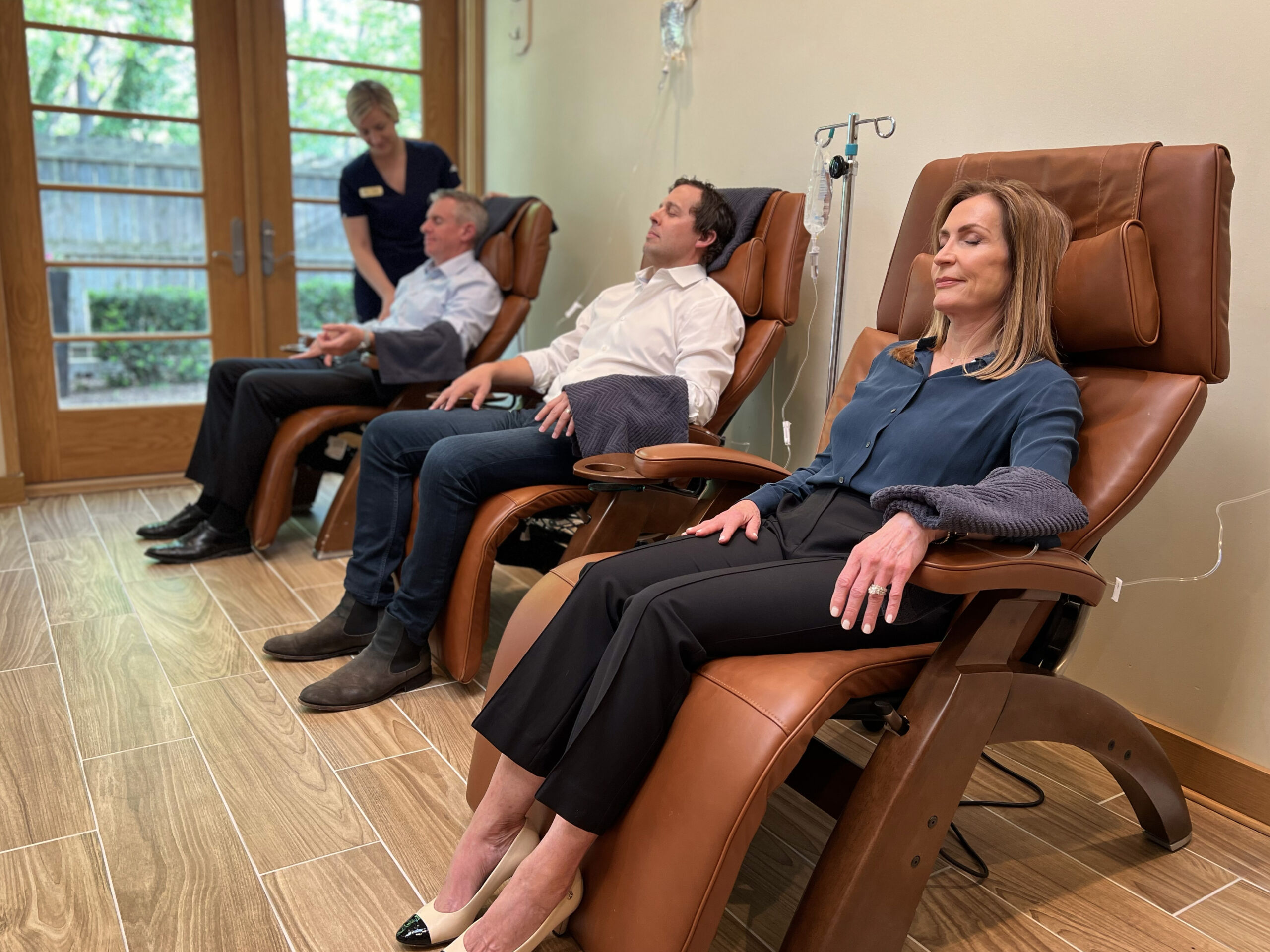Did you know that there is a very simple key to living longer? It’s a remedy that also enhances your memory, makes you more creative, slows aging, keeps you healthy, prevents disease, and makes you happier overall. It sounds too good to be true, doesn’t it?
The secret? Sleep. You’ve probably heard many times that sleep is important for your brain. You may have even experienced how difficult it is to process and think straight when you’re lacking rest. But the benefits of good quality sleep go far beyond that. Sleep influences every aspect of your body’s ability to function — and just as good sleep habits can greatly improve your well-being, bad sleep habits can put you at much greater risk for disease and illness.
You’ve probably been told repeatedly that you should be getting 7-9 hours of sleep every night, that you shouldn’t use electronics right before bed, and other common tips. But do you know why those things are so important? In order to grasp just how impactful good sleep is on your health, it’s important to understand your internal clock, the science behind why your body needs sleep, and how it generates it.
Why Do You Need Sleep?
A good night’s sleep gives your brain and body time for a full reset. According to Dr. Varsha Rathod, rheumatologist and functional medicine physician at PALM Health, “One way to think about it is that sleep restores what is ‘lost’ throughout the day as you expend energy, while also strengthening your bodily functions for optimal support.”
Within your brain alone, sleep has a massive influence. When you are well-rested, you have an increased ability to learn, memorize, make logical decisions, and recalibrate emotions. Dreaming also inspires your creativity in ways you may not realize. On the whole, your psychological health and even your safety greatly improve with sleep.
Throughout the rest of your body, a good night’s sleep will help restore your immune system, regulate your appetite, maintain a flourishing microbiome in your gut, and keep your heart fit by lowering your blood pressure. Your metabolic state also benefits because while you sleep, your body has time to fine-tune the balance of insulin with glucose in your blood.
How Your Body Generates Sleep
In addition to understanding why sleep is essential for your well-being, it’s important to understand how sleep works so you can optimize your nighttime routine to achieve the best quality sleep. There are two main factors that govern your sleeping and waking cycles: signals from your internal clock and what is called “sleep pressure.”
Internal Clock
You may have heard the term “internal clock” before, but did you know that your body (and all living organisms, in fact) has multiple biological clocks that govern different aspects of your health? In order to keep all of these biological clocks in sync, you also have a “master” clock in your brain that coordinates them.
In humans, the master clock is a group of about 20,000 neurons that are grouped together in a structure known as the suprachiasmatic nucleus, or the SCN. The SCN sits in your hypothalamus, which is in the undersurface of your brain. So, why is it so powerful when it comes to governing sleep?
The SCN works closely with your circadian rhythm to determine your sleep patterns. Various signals from your body and environment are processed by your SCN and influence your circadian rhythm, and therefore, your sleep. These signals include timing of food, timing of social interactions, body temperature, and more. Most importantly, however, your internal clock relies upon signals from different amounts and types of light around you.
Sleep Pressure
“Different kinds and levels of light trigger signals that affect what is known as your ‘sleep pressure,’” says Dr. Rathod. Your SCN receives signals directly from your optic nerves about how much light there is around you and responds accordingly.
When there is less light — at night, for example — your SCN tells your brain to start producing melatonin, a neurotransmitter and hormone that makes you sleepy. As the evening arrives and your brain responds to the decreasing light by releasing more melatonin, it builds a “sleep pressure” that grows until you actually go to sleep. When there is more light during the daytime, your SCN responds to the light by suppressing melatonin production so you feel awake.
How Your Sleep Can Become Disrupted
If you don’t sleep well, or enough, it can throw off your internal clock and entire circadian rhythm because the signals going to your brain are no longer regular. There are many ways your clock can become disrupted and lead to sleep deprivation, including electronic usage at night and sleep disorders.
Remember that various kinds of light can affect your internal clock differently. Blue light, for example, can play a major role in disrupting your sleep. Blue light is a specific kind of light that is taken in from screens like your cell phone, television, computer, or other electronic devices. Using electronics after the natural light outside has gone down and your brain has begun creating sleep pressure will send blue light signals to the SCN and suppress melatonin production, confusing and interrupting your clock. As a result, it may be more difficult to fall asleep or get quality sleep.
Sleep disorders, like insomnia or sleep deprivation disorder, can also greatly reduce your ability to reap the benefits of a healthy sleep cycle. According to Dr. Rathod, “Insomnia is defined as an inadequate ability to generate sleep despite allowing oneself adequate opportunity to get it, resulting in poor quality and quantity of sleep.” In other words, you can’t sleep even if you try. On the flip side, sleep deprivation disorder is an adequate ability to sleep but giving oneself inadequate opportunity to sleep — you can sleep but don’t allow yourself to.
Effects of Sleep Deprivation on Your Body and Mind
Regardless of the cause, sleep deprivation can not only impact your daily function, but also create more health issues down the line.
You’ve probably experienced what it’s like to try to go about your daily tasks after a night of poor sleep or lack of sleep. You may have been irritable and unfocused, or had trouble with reaction time, remembering things, and being productive. Cognitive impairment and impaired moral judgment are common effects of poor sleep, but when experienced long-term as a result of ongoing sleep deprivation, they can start to impede your work life and personal life.
If you’re not getting enough sleep, you may also notice the effects on your body. Athletic and fitness performance suffers greatly without sleep, so working out may become very difficult. Tremors, aches, and pains may come with sleep deprivation. Because sleep is critical for maintaining a strong and healthy immune system, a lack of sleep can also cause you to get sick easily and more often. In the long term, sleep deprivation can drive up your risks of chronic diseases like Type 2 diabetes, obesity, and heart disease.
Bottom line: your body simply cannot function to its full potential without enough good quality sleep. So what can you do to improve your sleep?
How to Improve Your Sleep
In order to get the most out of your sleep, the key is to establish a regular sleep schedule and nighttime routine. Once you get in the habit of following this routine, your internal clock will become accustomed to the pattern and send those signals to your brain more regularly. Your body will produce melatonin at the right times and your circadian rhythm will function more fluidly.
Elements of a Healthy Sleep Schedule
There are three main ways to get into a routine sleep schedule: establish regular sleep and wake times; limit blue light at night; and keep your environment conducive to good quality sleep.
Going to sleep at the same time every night and waking up at the same time every morning will encourage your body to start naturally recognizing the patterns and begin priming you for bedtime at an appropriate time. Eventually, it will become easier for you to fall asleep quickly and stay asleep through the night.
Recall that the amounts and types of light you’re exposed to throughout the day influence your internal clock and the production of sleep hormones. Most disruptive is the blue light that is emitted by your computer, TV, and cell phone. According to Dr. Rathod, “To keep your melatonin production normal and undisrupted, shut off your devices well before bedtime.” Try to engage in a different relaxing activity to wind down, such as reading, deep breathing, meditation, or taking a bath.
Finally, it’s important to maintain an environment that will facilitate a good night’s sleep. It’s best to keep your bedroom temperature at 65 degrees at nighttime, making sure to keep your hands and feet warm. It should also be dark and quiet, with minimal LED lighting. Oftentimes, essential oil diffusers can help sustain a peaceful and relaxing environment as well.
Looking for more helpful tips? Check out our blog article 6 Tips for More Restful Sleep for more ideas to help improve your sleep.
Ultimately, sleep is what keeps your brain running and allows your body to detoxify and fine-tune its natural processes. It’s essential to your health and well-being. So, it’s worth taking a look at your current sleep habits and evaluating how healthy they really are. Then, you can decide how to establish a regular sleep schedule and reset your internal clock so you can ensure better long-term health and wake up each morning ready to take on each day.
PALM Health is an innovative, whole-person medical and wellness company that helps people reach and maintain well-being. Our experts in medicine and wellness empower people to transform their health, become more resilient, and feel their personal best in mind and body.








